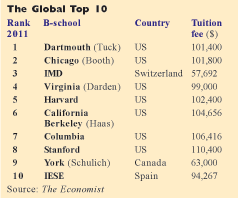 Dartmouth College’s Tuck School of Business is top-ranked in The Economist’s ninth annual ranking of full-time MBA programmes. The New Hampshire-based B-school has moved up from second position last year. Virtually all its students — who went into a wide range of industries — found work within three months of graduating. Its MBAs could expect a basic salary of $107,000 (Rs.54.5 lakh) per year, a 65 percent increase on their pre-degree earnings. Tuck students also graded the quality of their alumni the best in the world — an important consid-eration, given the often-repeated claim that who you meet on an MBA programme is just as important as what you learn.
Dartmouth College’s Tuck School of Business is top-ranked in The Economist’s ninth annual ranking of full-time MBA programmes. The New Hampshire-based B-school has moved up from second position last year. Virtually all its students — who went into a wide range of industries — found work within three months of graduating. Its MBAs could expect a basic salary of $107,000 (Rs.54.5 lakh) per year, a 65 percent increase on their pre-degree earnings. Tuck students also graded the quality of their alumni the best in the world — an important consid-eration, given the often-repeated claim that who you meet on an MBA programme is just as important as what you learn.
Chicago drops to second, having come top last year, while the world’s most famous school, Harvard, also drops a place to fifth. Europe’s top programme is IMD, a Swiss school, which ranks third. Though INSEAD has campuses in both France and Singapore, no purely Asian school makes the top 30. Hong Kong University, at 36, is the highest ranked. The China Europe International Business School is the only mainland B-school to make the top 100. The Indian Institute of Management in Ahmedabad, India’s sole representative and the toughest business school in the world to get into, is ranked 78.
Rising cost of child care
Gone are the days when a mother’s place was in the home. In contemporary Britain, women with children are now as likely to be in paid work as their unencumbered sisters. Many put their little darlings in day care long before they start school. Mindful that a poor start can blight a child’s chances of success later in life, the state has intervened ever more closely in how babies and toddlers are looked after. Inspectors call not only at nurseries but also at homes where youngsters are minded; three-year-olds follow the national curriculum. Child care has increasingly become a profession.
For years after the government first began in 2001 to twist the arms of anyone who looked after an unrelated child to register with the schools inspectorate, the numbers so doing fell. Kind but clueless neighbours stopped looking after little ones, who were instead herded into formal nurseries or handed over to one of the ever-fewer registered child minders.
The new lot are certainly better qualified. In 2010, fully 82 percent of nursery workers held diplomas notionally equivalent to A-levels, the university entrance exams taken mostly by 18-year-olds, up from 56 percent seven years earlier, says Anand Shukla of the Daycare Trust, a charity. Nurseries staffed by university graduates tend to be rated highest by inspectors, increasing their appeal to the pickiest parents. As a result, more graduates are being recruited.
But professionalisation has also pushed up the price of child care, defying even the economic slump. A survey by the Daycare Trust finds that a full-time nursery place in England for a child aged under two, who must be intensively supervised, costs £194 (Rs.15,700) per week, on average. Prices in London and the south-east are far higher. Parents in Britain spend more on child care than anywhere else in the world, according to the OECD, a think-tank. Some 68 percent of a typical second earner’s net income is spent on freeing her to work, compared with the OECD average of 52 percent.
The price of child care is not only eye-watering, but has also become a barrier to work. Soon after it took power, the Conservative LibDem coalition government pledged to ensure that people are better off in work than on benefits. But a recent survey by Save the Children, a charity, found that the high cost of day care prevents a quarter of low-paid workers from returning to their jobs once they start a family. The government pays for free part-time nurseries for three and four-year-olds, and contributes towards day-care costs for younger children from poor areas. Alas, extending such a subsidy during straitened economic times seems to be anything but child’s play.
(Excerpted and adapted from The Economist)